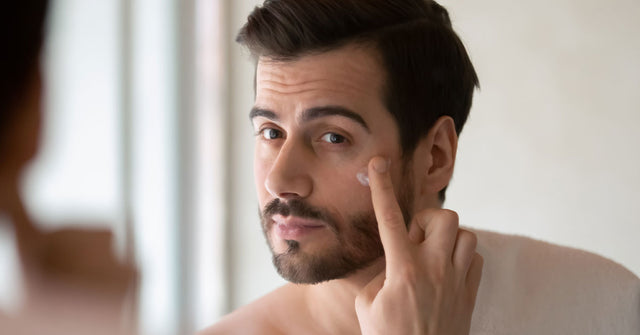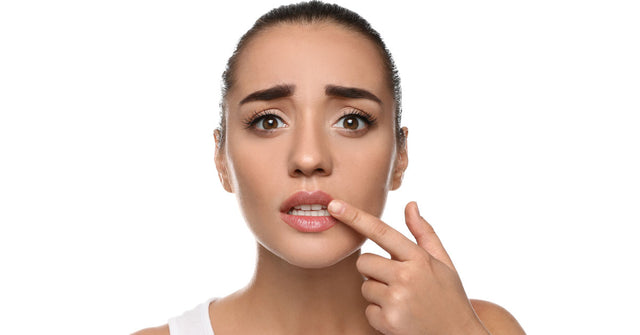Does your skin react strongly to the products you use? Do you get itchy, red, or irritated skin? If so, you might have sensitive skin. People with sensitive skin often experience burning or itching when they use specific skincare products or even just come into contact with environmental factors such as wind, pollution, heat, and cold.
Sometimes, people with sensitive skin have poor barrier function. This means that the outer layer of the skin meant to protect us from outside irritants isn’t able to do its job effectively. Other people have an overly strong immune response to substances on the skin, and some people have too much nerve density in their skin, which causes strong physical reactions to irritants and other stimuli.
Many people with sensitive skin have dry skin, and they are more likely to have other underlying skin issues than people who don’t have sensitive skin. Skin disorders [1] commonly seen in people with sensitive skin are rosacea, atopic dermatitis, psoriasis, acne, and seborrheic dermatitis.
Finding skin care products that don’t trigger hyperreactivity and help strengthen the skin barrier can be challenging. However, finding a moisturizer that nourishes and protects the skin is one of the most important things you can do for your sensitive skin. In this article, we’ll discuss what to look for in a moisturizer and what ingredients are best to avoid.
What to Look for in a Moisturizer
Here is a list of features to look for when choosing a moisturizer for sensitive skin. These are all components that can help protect and heal hyperreactive skin.
1. Excellent hydration
A skin barrier that doesn’t work the way it should, especially when the skin is dry, needs hydration to work better. A moisturizer containing humectants which are substances that draw water to the skin's surface is an excellent choice. Some commonly used humectants [2] are glycerin, hyaluronic acid, urea, peptides, and aloe vera.
2. Contains antioxidants
Reactive, inflamed, sensitive skin is not as well-equipped to combat free radicals in the environment as non-sensitive skin. This means that free radicals have an easier time causing oxidative stress (a chemical process that can damage cellular structures and even DNA) to the cells on the surface of sensitive skin. Oxidative stress can cause wrinkles, dryness, rough skin, and hyperpigmentation.
Antioxidants combat free radicals and protect the skin from oxidative damage. Every skin type could benefit from products containing antioxidants, but sensitive skin especially so. Some examples of antioxidants are vitamins C and E, algae, resveratrol, caffeine, niacinamide, and coenzyme Q.
3. Brightening ingredients
The dryness that often accompanies sensitive skin can take away some of the vibrance you want to see on your skin. Dry skin can look dull because of flaky skin, rough texture, and fine lines. Look for brightening ingredients in your moisturizer to combat dullness.
One such ingredient is licorice root extract, an effective antioxidant and skin brightener that inhibits the formation of melanin in the skin. Arbutin can also brighten and protect sensitive skin, and azelaic acid decreases inflammation and pigmentation.
4. Soothing and healing
Look for ingredients that help your skin repair its barrier and heal irritation. Ceramides [3] are some of the best ingredients you can choose to help soothe and heal your sensitive skin. Ceramides perform several beneficial functions on the skin, but one of the most important is that they help to repair the skin barrier. They also increase moisture in the skin and protect it from outside irritants.
What to Avoid in a Moisturizer
When you have sensitive skin, it is important to read the ingredient lists and know what to avoid in your products.
- Although alcohols are generally not an issue for normal skin types, it's best to say no to most alcohols if you have sensitive skin. Benzyl alcohol, methanol, ethanol, and denatured alcohol are all no-nos for sensitive skin and can cause dryness and irritation. One category of alcohol that might be okay for sensitive skin is fatty alcohol. These include cetearyl alcohol, cetyl alcohol, and isostearyl alcohol, which can help keep your skin moisturized. Super sensitive skin is the exception and might suffer irritation even from these gentle, emollient alcohols.
- Fragrance is not often a friend to people with sensitive skin. People with sensitive skin are at risk of developing contact dermatitis when exposed to fragrances, even natural ones like essential oils. These allergic reactions can get worse after repeated exposures.
- Physical exfoliators such as apricot kernels, sugar scrubs, and even rough washcloths are enemies of sensitive skin. Physical exfoliation temporarily disrupts the skin barrier and allows the skin to dry out, both things that sensitive skin does not need. Physical exfoliators can worsen dryness, inflammation, and irritation in people with sensitive skin.
The Best Moisturizers for Sensitive Skin
The best moisturizers for sensitive skin will contain ingredients that protect and repair the skin barrier, improve hydration, brighten the complexion, and soothe irritation and inflammation. Infusoderm is an excellent example of a moisturizer that addresses sensitive skin's unique needs.
Infusoderm contains a powerful trio of moisturizing ingredients derived from plant sugars, Xylitylglucoside, Anhydroxylitol, and Xylitol, as well as glycerin, aloe vera, and other hydrating ingredients that dramatically improve skin hydration in 89% of users.
Infusoderm contains various antioxidants, such as caffeine and snow algae, that protect the skin from free radical damage and help brighten the complexion. It also contains cloudberry, a potent antimicrobial and antioxidant that contains vitamins A, C, and E and promotes collagen growth in the skin.
Customers give Infusoderm 5-star reviews and report improvements in dryness, dullness, and notice brightness within four weeks of regular use. Users with sensitive skin report no irritation or adverse effects from this gentle and nourishing moisturizer, and people with normal and combination skin types also enjoy using this product.
Tips for Using Moisturizers With Sensitive Skin
According to the American Academy of Dermatology Association, the following are the best way to wash and moisturize sensitive skin:
- Cleanse your skin gently with your fingers and choose a non-irritating, alcohol-free cleanser.
- Rinse your face with lukewarm water. Extremely hot or cold water can trigger sensitive skin.
- Apply moisturizer to damp skin.
- Use gentle application techniques and avoid pulling on the skin around your eyes.
Don’t forget to protect your skin from the sun every day. Sunscreen is imperative for all skin types, including sensitive. Some people find that mineral sunscreens are the most gentle to their sensitive skin, although there are also chemical and hybrid sunscreens available that are formulated specifically for sensitive skin.
Frequently Asked Questions
Q: Why do I need a specific moisturizer for sensitive skin?
A: You don’t necessarily need a specific moisturizer, but you do need to choose one that meets your unique skin's needs. Avoid products that contain ingredients that irritate or dry out your sensitive skin.
Q: What should you avoid if you have sensitive skin?
A: Avoid abrasive cleansers, harsh alcohols, and fragrances (including those in hair and laundry products), and don’t ever skip your moisturizer or sunscreen.
Q: Can a moisturizer for sensitive skin be used under make-up?
A: Absolutely. Your make-up will probably sit better on the skin and look more radiant if you consistently provide your skin with the moisture and protection it needs.
You may also like to read - Skincare routine for sensitive skin
Conclusion
Your sensitive skin might need a little extra pampering to keep it healthy and beautiful, but with some knowledge about sensitive skin and ingredients used in skin care, you can give it everything it needs to be at its best. If you consistently support your skin barrier and provide adequate moisture to your skin, you will have strong, healthy, radiant skin for years to come.
References
1] ↑https://www.ncbi.nlm.nih.gov/pmc/articles/PMC8359429
2] ↑https://labmuffin.com/skincare-chemistry-which-ingredients-are-humectants/
3] ↑https://health.clevelandclinic.org/ceramides/
Mentioned in this article
More stories

Quick and Effective: Streamlined Skincare Routine for Busy Men








